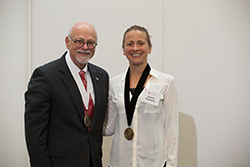Energy Award Supports Research on New Method of Making Ammonia

Ammonia production accounts for 3 percent of the world's carbon-dioxide emissions and consumes about 2 percent of the world's energy resources.
FAYETTEVILLE, Ark. – University of Arkansas engineering professor Lauren Greenlee and her colleagues at Case Western Reserve and Pennsylvania State universities have received a $599,373 award from the U.S. Department of Energy to study an alternative method for making ammonia.
Ammonia, a compound of nitrogen and hydrogen, is a colorless gas used as fertilizer in agricultural and food production. It is also used in many commercial cleaning products and as a building block for the synthesis of pharmaceutical products.
The standard method for producing commercial ammonia, the Haber-Bosch process, uses an iron-based catalyst and has not changed for about 100 years. It is a highly energy-intensive industrial process that accounts for 3 percent of the world’s carbon-dioxide emissions and consumes about 2 percent of the world’s energy resources. For these reasons, the Department of Energy and other agencies are seeking alternative technologies that demand less energy and are less harmful to the environment.
Chemists have tried to develop synthetic catalysts to replace the multi-stage Haber-Bosch process of combining nitrogen and hydrogen at high temperature and pressure. But they’ve run into problems with these alternative methods. Electrocatalysts – catalysts that function at electrode surfaces – struggle with the electrochemical reduction of water to hydrogen. Until the selectivity of the catalyst can be controlled, this technology will remain out of reach.
With help from colleagues Julie Renner at Case Western Reserve University and Mike Janik at Pennsylvania State University, Greenlee will focus on developing synthetic electrocatalysts that can reduce nitrogen gas to ammonia at temperatures below 100 degrees Celsius. They will try to develop a better understanding of how nitrogen and water interact with catalyst surfaces.
 |
| Lauren Greenlee with University of Arkansas Chancellor Joe Steinmetz. |
“Much is still unknown about this electrochemical reaction,” Greenlee said. “While the end goal of this work is to develop synthetic electrocatalysts for ammonia production, we will first take a huge step back and simply try to understand reactant transport to the catalyst surface.”
Greenlee holds the Louis Owen Professorship in Chemical Engineering.
About the University of Arkansas: The University of Arkansas provides an internationally competitive education for undergraduate and graduate students in more than 200 academic programs. The university contributes new knowledge, economic development, basic and applied research, and creative activity while also providing service to academic and professional disciplines. The Carnegie Foundation classifies the University of Arkansas among only 2 percent of universities in America that have the highest level of research activity. U.S. News & World Report ranks the University of Arkansas among its top American public research universities. Founded in 1871, the University of Arkansas comprises 10 colleges and schools and maintains a low student-to-faculty ratio that promotes personal attention and close mentoring.
Topics
Contacts
Lauren Greenlee, assistant professor, chemical engineering
College of Engineering
479-575-5976,
greenlee@uark.edu
Matt McGowan, science and research communications officer
University Relations
479-575-4246,
dmcgowa@uark.edu
Headlines
Affairs of the Heart
Find out how biomedical engineering professor Morten Jensen is developing innovative devices to produce better outcomes in cardiovascular medicine.
Students, Faculty and Alumni Kick Off Centennial Year of School of Law
Founded April 14, 1924, the School of Law faculty, students and alumni started the celebration of its centennial year with a Founders Day event and will continue with more commemorative events this coming fall.
Yearly Academic Award Winners, Ambassadors Recognized by Bumpers College
Schyler Angell, Lexi Dilbeck, Cason Frisby, Tanner Austin King, Anna Brooke Mathis, Carrie Ortel, Lucy Scholma, Kadence Trosper and student ambassadors were honored at the college's annual reception.
World Premiere of 'Cries from the Cotton Field' Slated for May 8
Cries from the Cotton Field chronicles the journey of 19th century Italian immigrants from northern Italy to the Arkansas Delta and ultimately to Tontitown. It will premier at 6 p.m. May 8 in Springdale Har-Ber High School.
Fay Jones School's Earth Day Event Spotlights Sustainable Materials and Projects
"One day doesn't seem like a lot, but one day can empower individuals and groups, energize them to work for change and innovate for transformative solutions," professor Jennifer Webb said of the students' design work.




